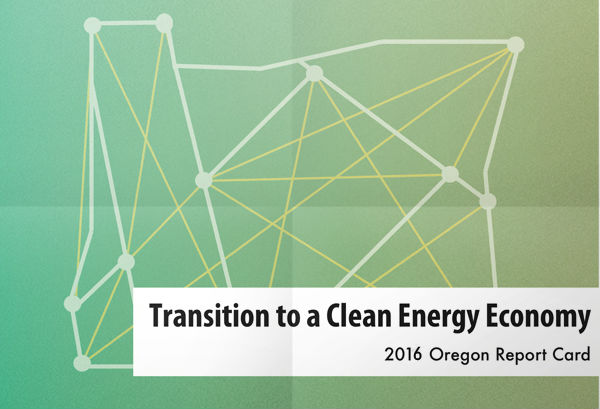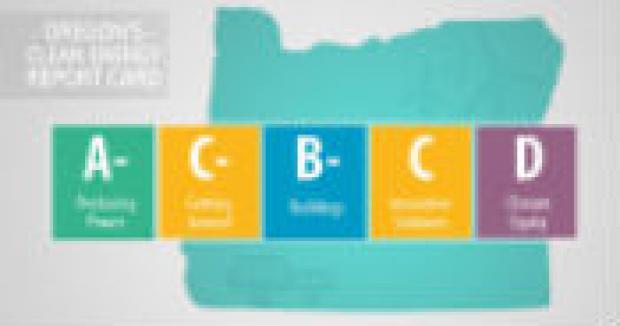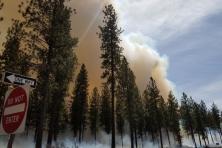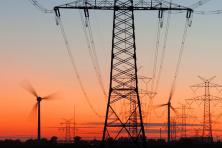Oregonians got a wake-up call last week. A new Climate Assessment Report (summarized here) has found that not only will climate change have devastating consequences for Oregon in the coming decades, but we are already experiencing serious impacts today. Burning fossil fuels to power our homes, cars and industries has already led to decreased snowpack, increased heat waves, drought and wildfires, increased acidity of our oceans, and coastal erosion across our state.
The report found that climate change will significantly impact our state economy, and will hit Native American tribes in Oregon the hardest. If we don’t act urgently and boldly to curb our greenhouse gas emissions, Oregon’s climate is projected to continue warming three to seven degrees fahrenheit by the 2050s and five to eleven degrees by the 2080s. That rapid warming means that if we continue business as usual, Oregon will have as many ninety-five degree days in 2100 as Texas does now. The good news is that we know the solutions to curb this climate catastrophe, and we can lead the transition to a twenty-first century clean energy economy.
A new Oregon clean energy report card by the Renew Oregon coalition grades the state’s progress in shifting from dirty to clean energy, and provides a blueprint for the solutions needed to create clean energy jobs and a safe and stable economy.
Ten years ago, Oregon adopted targets for reducing climate pollution. Unfortunately, our state is falling far short of them – especially troubling at a time when the new federal government questions sound science and facts, and promises to backtrack on climate progress at a dizzying pace. Oregon’s innovative spirit and leadership is more needed than ever.
Here are some of the report’s key findings and grades:
Producing Power (A-): Thanks in significant part to the passage of the Clean Electricity and Coal Transition Act last year and decreasing wind and solar prices, Oregon gets an A- for its approach to producing the state’s power. By 2040, around 80% of Oregon electricity will be carbon-free, including 50% powered by renewable energy – with no coal power.
To meet our growing energy needs, Oregon can combine new renewables with continued energy efficiency investments and developing technology in smart grids, energy storage, and demand response. To continue our clean power leadership, Oregon should provide smart, well-managed financial incentives to encourage the continued growth of the solar, wind and other clean energy industries. Our utilities should invest in energy efficiency and renewable energy to power our homes and businesses cleanly, not expensive, unnecessary gas plants or other fossil fuel infrastructure.
Getting Around (C-): Nothing causes more climate-changing pollution in Oregon than how we move people and goods. Oregon earns a poor grade of C- in transportation due to the huge need to expand transit, the lack of walking and biking options, and the need to accelerate the adoption of more electric cars, buses, and freight.
To boost our grade in the transportation sector, there are several areas for improvement. Our transit system is woefully underfunded, which means many Oregonians are unable to reach jobs and other daily needs, and transit systems are unable to keep up with increased ridership, the needs of youth, and the needs of elderly and disabled citizens. In addition, Oregon has no state incentives for anyone, including low-income residents, to buy electric cars, despite having one of the best charging station networks in the country. By 2035, Oregon’s freight traffic volume will increase by 60%, making it one of the fastest growing sources of transportation-related climate pollution.
Our pioneering Clean Fuels program is the bright spot here, as it reduces the amount of carbon pollution spewing from our cars, begins to hold oil companies responsible for the climate pollution from their fuels, and creates new jobs around the state. As the legislature considers how to fund and fix our infrastructure this year, developing a climate-smart transportation plan is a necessary step toward filling these gaps and delivering cleaner air and better mobility around the state.
Buildings and Operations (B-): Oregon has historically been a national leader in energy efficiency, but we have slipped behind our neighboring states, earning a B- grade. Oregon is undergoing a building boom expected to result in the construction of more than 700,000 new homes and apartments, and a whopping 800 million sq. feet of commercial building space by 2050. Oregon has the opportunity to upgrade our building standards now to more than double the energy efficiency in new buildings, which will reduce climate pollution, improve air quality, and save owners and renters a billion dollars by 2050.
Foster Innovative Solutions (C): With federal action to combat climate change highly unlikely for the next four years, it is more important than ever that states and cities lead the way. According to the report card, Oregon’s climate costs will add up to at least $3.6 billion per year by 2040. Currently, the largest polluters and fossil fuel companies pollute our air for free, while the rest of us pay for it with our health, economic, and environmental problems. To strengthen Oregon’s clean energy economy and improve our C grade, Oregon should reduce our climate and air pollution and address super-pollutants like methane and black carbon.
A key strategy is to hold large polluters accountable by limiting the carbon pollution they can pump into the air, putting a price on pollution, and using the proceeds to invest in clean energy solutions. These proceeds could stimulate new job creation, economic reinvestment in communities across the state, expanded transit, more electric vehicles, more efficient homes and businesses, and healthier communities, including the communities most affected by climate change and dirty fossil fuels.
Climate Solutions, together with the Renew Oregon coalition, is working with legislators to pass a law in the 2017 session that limits carbon pollution and develops a clean energy investment program that will benefit low income and impacted communities.
Climate Equity (D): In Oregon and across the country, already disadvantaged communities are also those hit first and worst by pollution from gasoline and diesel fuel, extreme weather including heat waves, intense storms and droughts, destructive wildfires, and other impacts of climate change. Yet Oregon has not prioritized the needs of these communities, leading to a failing D grade. To find meaningful solutions for Oregon’s climate future, communities hit earliest and hardest by the impacts of climate and air pollution need a leading role in developing solutions. These frontline communities should also receive the public resources needed to protect themselves, including affordable, energy efficient housing and transportation.
Oregon has made some impressive strides in recent years, including developing the Clean Fuels program and passing the Clean Electricity and Coal Transition Act, but the report card finds many areas that still need improvement. On the 10th anniversary of Oregon’s climate goals, the report card is an essential tool to assess what Oregon has accomplished and where we still need to improve to shift to a clean energy economy.






